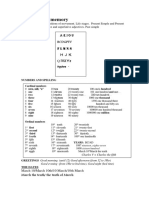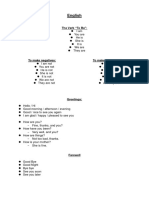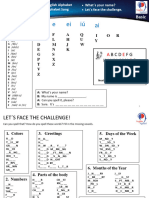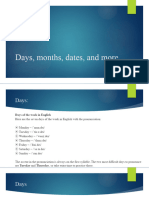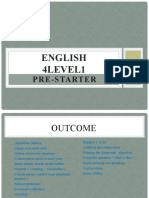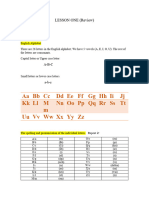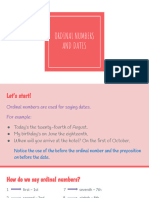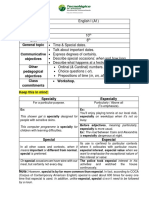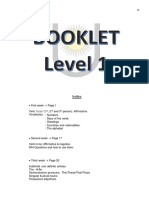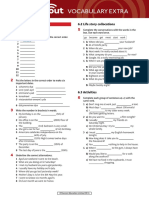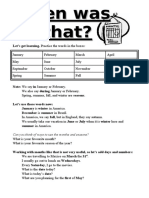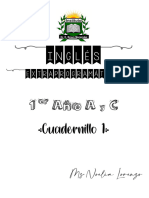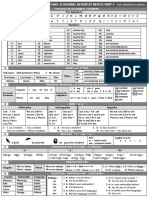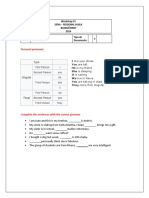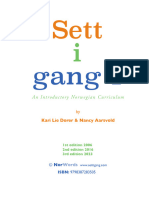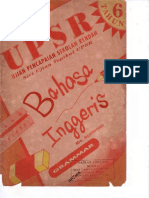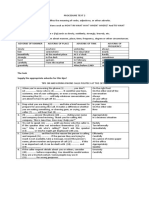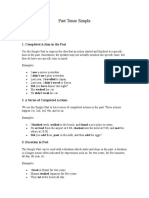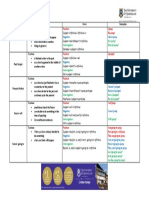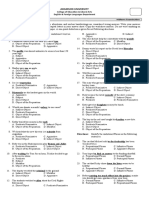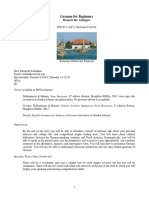Introduction to English Language Basics
1-Alphabet (The ABC)
ABCDEFGHIJKLMNOPQRSTUVWXYZ
• Consonant: B C D F G H J K L M N P Q R S T V W X Y Z
• Vowels: A E I O U + Y
The letter “Y” can be both a consonant and a vowel.
Example: Yes → consonant
Why → vowel /аɪ/
Pretty → vowel /i/
VOCABULARY
2-Days of the week: 5 days+ 2 days of weekend
• Sunday, Monday, Tuesday, Wednesday, Thursday, Friday and Saturday.
Example: In Algeria, Friday is a holyday whereas in England, Sunday is their holyday.
• 24 Hours: Dawn .. morning.. noon..afternoon.. evening.. dusk.. night.
Adjectives: Early=/=Late
Example:
English Speaking Café opens early in the morning at 8 and closes at dusk around 8 but is summer,
closing time extends to late nights around 11 pm or even midnight.
Midday =/= midnight
Greeting Expression:
• Good morning!
• Good afternoon!
• Good evening!
• Goodnight!
1
�3- Months of the year:
January, February, March, April, May, June, July, August, September, October, November & December.
4- Seasons of the year:
Winter, spring, summer, autumn/fall
Example:
A: It’s finally springtime so beautiful and warm
B: ya I know but I prefer winter..
A: oh no why?!!! It’s always cold and even freezing sometimes
B: well ya exactly!! I love the cold weather, the rain, the thunder sound everything about winter makes it
cozy and romantic; I get to enjoy my hot chocolate in my sweatshirts and hoodies. I just love it!!
A: I see now, right that’s still better than autumn, back to school time agghh, I just hate it.
B: I know right, makes it hard to go back to school after that long hot summer break
Adjectives:
Cold =/= Hot
Example: In autumn, temperature gradually decreases and starts getting cold, windy and even rainy
sometimes
5- Adverbs of frequency:
• Always 100%
• Usually 90%
• Often 70 to 80%
• Sometimes 50%
• Rarely/hardly ever 10 to 20%
• Never 0%
Example:
A. I rarely sleep late because I always work early in the morning, so I often go to bed around 9.30 or 10,
right after prayer time usually, because I never want to wake up tired
B. So you’re always on time
A. yep! I am never late to work
2. Sometimes, she just prefers staying home and enjoys her hobby in the calm.
2
�6- Numbers:
Cardinal numbers:
• 1 One
• 2 Two
• 3 Three
• 4 Four
• 5 Five
• 6 Six
• 7 Seven
• 8 Eight
• 9 Nine
• 10 Ten
• 11 Eleven
• 12 Twelve
• 13 Thirteen
• 14 Fourteen
• 15 Fifteen
• 16 Sixteen
• 17 Seventeen
• 18 Eighteen
• 19 Nineteen
• 20 Twenty…..21 Twenty-one….22 Twenty two….23 Twenty three……….29 Twenty nine
• 30 Thirty…31 thirty one…. Thirty two….
• 40 Forty
• 50 fifty
• 60 Sixty
• 70 Seventy
• 80 Eighty
• 90 Ninety
• 100 One hundred… 101 One hundred and one
• 200 two hundred
• 1000 One thousand
• 10000 Ten thousand
• 100000 One hundred thousand
• 1000,000 One million
• 10,000,000 Ten million
3
�Ordinal numbers:
• 1st First 21st Twenty-first
• 2nd Second 22nd Twenty second
• 3rd Third 23rd Twenty-third
• 4th Fourth 24th Twenty-Fourth
• 5th Fifth 25th Twenty-fifth
• 6th Sixth 26th Twenty-sixth
• 7th Seventh 27th Twenty-seventh
• 8th Eighth 28th Twenty-eighth
• 9th Ninth 29th twenty-ninth
• 10th Tenth
• 11th Eleventh
• 12th Twelfth
• 13th Thirteenth
• 14th Fourteenth
• 15th Fifteenth
• 16th Sixteenth
• 17th Seventeenth
• 18th Eighteenth
• 19th Nineteenth
• 20th Twentieth
• 30th Thirtieth….31st thirty-first… 32nd Thirty-second ….39th thirty-ninth
• 40th Fortieth
• 50th Fiftieth
Examples:
Date: We’re the 20th of May
She was born on the 23rd of March
His birthday is on the 2nd of September
Century: Queen Victoria was born on the 19th century (1819)
We’re on the 21st century
Order: He did so well in school; he came first in his class.
Floor location: English Speaking Café is on the 1st floor.
4
�7- Personal pronouns
• S* singular
• P* plural
• N* number
Person N Subject Object Possessive Possessive Reflexive
pronouns pronouns adjectives pronouns pronouns
1st S I Me My Mine Myself
Person p We Us Our Ours Ourselves
2nd S You You Your Yours Yourself
Person P You You Your Yours Yourselves
3rd S He Him His His Himself
Person S She Her Her Hers Herself
S It It Its Its Itself
P They Them Their Theirs Themselves
Examples:
1) Object pronouns
Help me!
Listen to him
My phone is over there, can you grab it for me
Please call them for dinner
2) Possessive adjectives and pronouns
a) Is that your pen or Maria’s?
b) No it’s hers/ it’s Maria’s
-The school and its classrooms are so bright
a) Hey do you need me to help you with your homework
b) Nah thanks, I’ll do it myself
5
�CONJUGATION
1- Present simple
It is used to define or describe someone
Example: Look! That’s my sister; she is so pretty and smart
It is also used to express regular habits, routines schedules or any action done in the present
time.
Example:
Every day, I get out of work at 4 pm.
I like drawing
To conjugate any verb in the present tense, we take the root form of the verb and add it to the
subject (I, you, we and they)
Add “s” or “es” with the third person
Example: To write (infinitive form)
We write
She writes
The verb “To Be” in Present simple
The verb “To be” is an irregular verb, so when conjugated in present simple, it changes form.
A) Positive form
I Am
You
We are
They
He
She is
It
Contracted form:
1. I’m busy
2. You’re funny
3. It’s complicated
6
� B) Negative form: Subject + Verb + not (+ object)
-No, he’s not a writer
-Hailey is not American, she is English
Contracted form:
I am not → I’m not
You are not → you aren’t
He is not → he isn’t
She is not → she isn’t
It is not → it isn’t
We are not → we aren’t
They are not → they aren’t
…………………………………………………………………………………………………….
GRAMMAR
Yes/No questions
Example: Are you okay?
V + S + Object + ?
Question: Is he from Algeria?
Answer: Yes, he is.
Question: What about her? Is she also from Algeria?
Answer: No, she isn’t.
7
�Example: 1)-Is it ok to sit here?
-Yes, it is.
2) Is everything ok?
- No, it isn’t == no, it is not (formal)
- No not really (informal)
